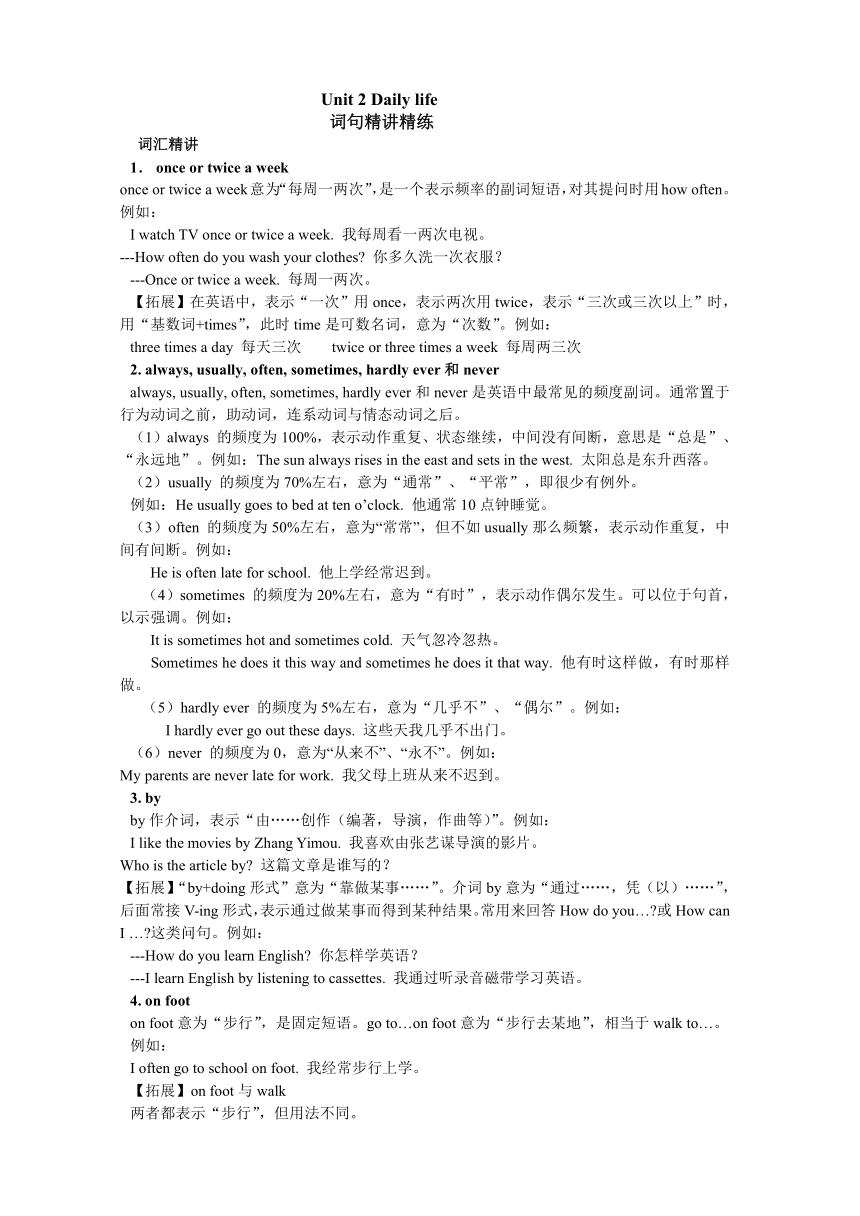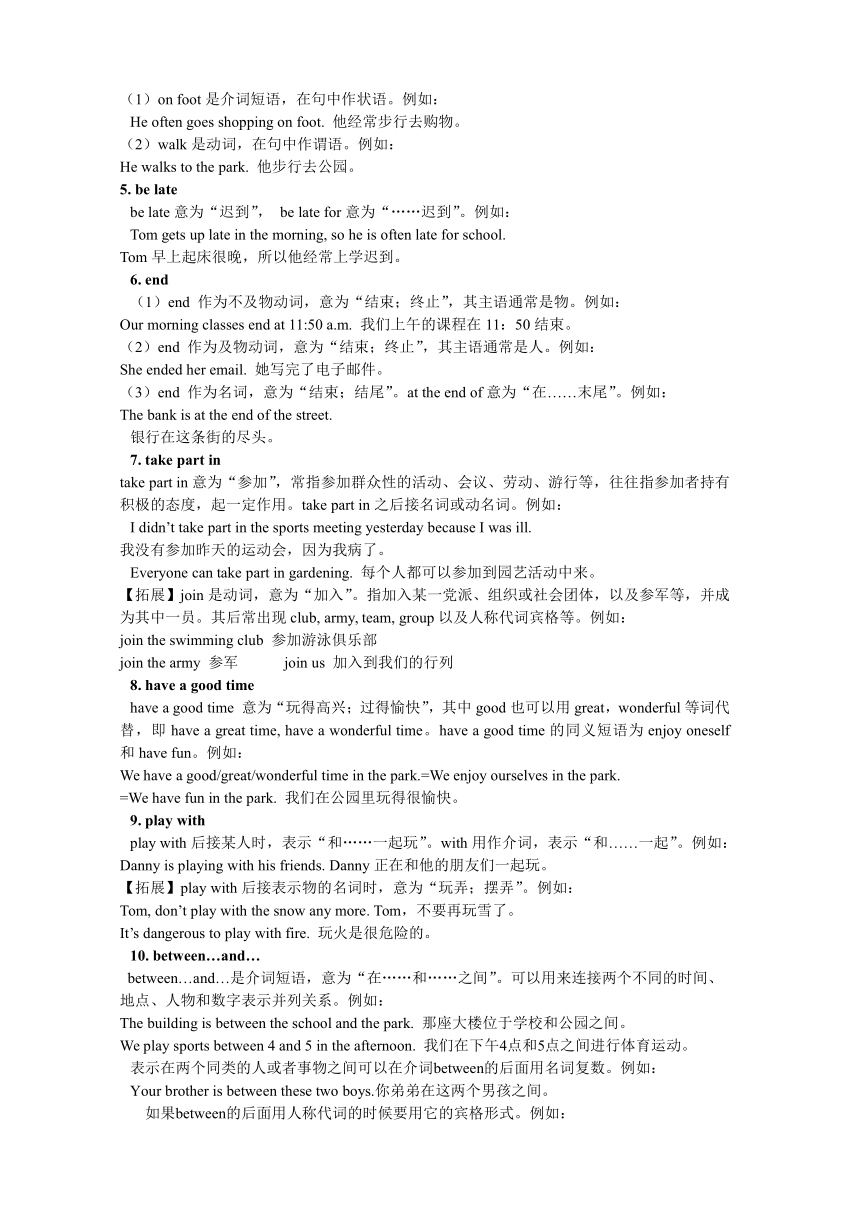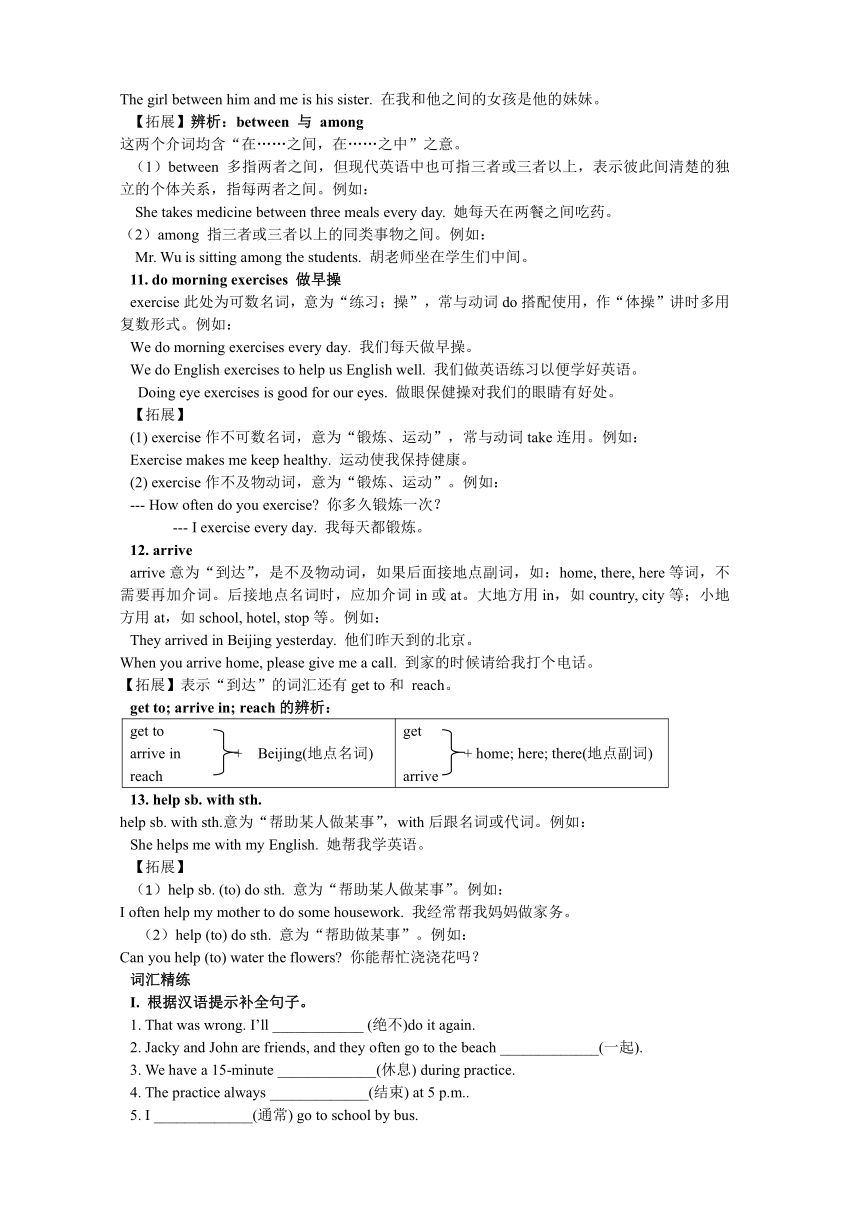英语沪教牛津版七上Unit 2 Daily life 词句精讲精练(含答案
文档属性
| 名称 | 英语沪教牛津版七上Unit 2 Daily life 词句精讲精练(含答案 |

|
|
| 格式 | zip | ||
| 文件大小 | 63.0KB | ||
| 资源类型 | 教案 | ||
| 版本资源 | 牛津深圳版 | ||
| 科目 | 英语 | ||
| 更新时间 | 2022-11-19 10:14:58 | ||
图片预览



文档简介
Unit 2 Daily life
词句精讲精练
词汇精讲
once or twice a week
once or twice a week意为“每周一两次”,是一个表示频率的副词短语,对其提问时用how often。例如:
I watch TV once or twice a week. 我每周看一两次电视。
---How often do you wash your clothes 你多久洗一次衣服?
---Once or twice a week. 每周一两次。
【拓展】在英语中,表示“一次”用once,表示两次用twice,表示“三次或三次以上”时,用“基数词+times”,此时time是可数名词,意为“次数”。例如:
three times a day 每天三次 twice or three times a week 每周两三次
2. always, usually, often, sometimes, hardly ever和never
always, usually, often, sometimes, hardly ever和never是英语中最常见的频度副词。通常置于行为动词之前,助动词,连系动词与情态动词之后。
(1)always 的频度为100%,表示动作重复、状态继续,中间没有间断,意思是“总是”、“永远地”。例如:The sun always rises in the east and sets in the west. 太阳总是东升西落。
(2)usually 的频度为70%左右,意为“通常”、“平常”,即很少有例外。
例如:He usually goes to bed at ten o’clock. 他通常10点钟睡觉。
(3)often 的频度为50%左右,意为“常常”,但不如usually那么频繁,表示动作重复,中间有间断。例如:
He is often late for school. 他上学经常迟到。
(4)sometimes 的频度为20%左右,意为“有时”,表示动作偶尔发生。可以位于句首,以示强调。例如:
It is sometimes hot and sometimes cold. 天气忽冷忽热。
Sometimes he does it this way and sometimes he does it that way. 他有时这样做,有时那样做。
(5)hardly ever 的频度为5%左右,意为“几乎不”、“偶尔”。例如:
I hardly ever go out these days. 这些天我几乎不出门。
(6)never 的频度为0,意为“从来不”、“永不”。例如:
My parents are never late for work. 我父母上班从来不迟到。
3. by
by作介词,表示“由……创作(编著,导演,作曲等)”。例如:
I like the movies by Zhang Yimou. 我喜欢由张艺谋导演的影片。
Who is the article by 这篇文章是谁写的?
【拓展】“by+doing形式”意为“靠做某事……”。介词by意为“通过……,凭(以)……”,后面常接V-ing形式,表示通过做某事而得到某种结果。常用来回答How do you… 或How can I … 这类问句。例如:
---How do you learn English 你怎样学英语?
---I learn English by listening to cassettes. 我通过听录音磁带学习英语。o 或
4. on foot
on foot意为“步行”,是固定短语。go to…on foot意为“步行去某地”,相当于walk to…。
例如:
I often go to school on foot. 我经常步行上学。
【拓展】on foot与walk
两者都表示“步行”,但用法不同。
(1)on foot是介词短语,在句中作状语。例如:
He often goes shopping on foot. 他经常步行去购物。
(2)walk是动词,在句中作谓语。例如:
He walks to the park. 他步行去公园。
5. be late
be late意为“迟到”, be late for意为“……迟到”。例如:
Tom gets up late in the morning, so he is often late for school.
Tom早上起床很晚,所以他经常上学迟到。
6. end
(1)end 作为不及物动词,意为“结束;终止”,其主语通常是物。例如:
Our morning classes end at 11:50 a.m. 我们上午的课程在11:50结束。
(2)end 作为及物动词,意为“结束;终止”,其主语通常是人。例如:
She ended her email. 她写完了电子邮件。
(3)end 作为名词,意为“结束;结尾”。at the end of意为“在……末尾”。例如:
The bank is at the end of the street.
银行在这条街的尽头。
7. take part in
take part in意为“参加”,常指参加群众性的活动、会议、劳动、游行等,往往指参加者持有积极的态度,起一定作用。take part in之后接名词或动名词。例如:
I didn’t take part in the sports meeting yesterday because I was ill.
我没有参加昨天的运动会,因为我病了。
Everyone can take part in gardening. 每个人都可以参加到园艺活动中来。
【拓展】join是动词,意为“加入”。指加入某一党派、组织或社会团体,以及参军等,并成为其中一员。其后常出现club, army, team, group以及人称代词宾格等。例如:
join the swimming club 参加游泳俱乐部
join the army 参军 join us 加入到我们的行列
8. have a good time
have a good time 意为“玩得高兴;过得愉快”,其中good也可以用great,wonderful等词代替,即have a great time, have a wonderful time。have a good time的同义短语为enjoy oneself和have fun。例如:
We have a good/great/wonderful time in the park.=We enjoy ourselves in the park.
=We have fun in the park. 我们在公园里玩得很愉快。
9. play with
play with后接某人时,表示“和……一起玩”。with用作介词,表示“和……一起”。例如:
Danny is playing with his friends. Danny正在和他的朋友们一起玩。
【拓展】play with后接表示物的名词时,意为“玩弄;摆弄”。例如:
Tom, don’t play with the snow any more. Tom,不要再玩雪了。
It’s dangerous to play with fire. 玩火是很危险的。
10. between…and…
between…and…是介词短语,意为“在……和……之间”。可以用来连接两个不同的时间、地点、人物和数字表示并列关系。例如:
The building is between the school and the park. 那座大楼位于学校和公园之间。
We play sports between 4 and 5 in the afternoon. 我们在下午4点和5点之间进行体育运动。
表示在两个同类的人或者事物之间可以在介词between的后面用名词复数。例如:
Your brother is between these two boys.你弟弟在这两个男孩之间。
如果between的后面用人称代词的时候要用它的宾格形式。例如:
The girl between him and me is his sister. 在我和他之间的女孩是他的妹妹。
【拓展】辨析:between 与 among
这两个介词均含“在……之间,在……之中”之意。
(1)between 多指两者之间,但现代英语中也可指三者或三者以上,表示彼此间清楚的独立的个体关系,指每两者之间。例如:
She takes medicine between three meals every day. 她每天在两餐之间吃药。
(2)among 指三者或三者以上的同类事物之间。例如:
Mr. Wu is sitting among the students. 胡老师坐在学生们中间。
11. do morning exercises 做早操
exercise此处为可数名词,意为“练习;操”,常与动词do搭配使用,作“体操”讲时多用复数形式。例如:
We do morning exercises every day. 我们每天做早操。
We do English exercises to help us English well. 我们做英语练习以便学好英语。
Doing eye exercises is good for our eyes. 做眼保健操对我们的眼睛有好处。
【拓展】
(1) exercise作不可数名词,意为“锻炼、运动”,常与动词take连用。例如:
Exercise makes me keep healthy. 运动使我保持健康。
(2) exercise作不及物动词,意为“锻炼、运动”。例如:
--- How often do you exercise 你多久锻炼一次?
--- I exercise every day. 我每天都锻炼。
12. arrive
arrive意为“到达”,是不及物动词,如果后面接地点副词,如:home, there, here等词,不需要再加介词。后接地点名词时,应加介词in或at。大地方用in,如country, city等;小地方用at,如school, hotel, stop等。例如:
They arrived in Beijing yesterday. 他们昨天到的北京。
When you arrive home, please give me a call. 到家的时候请给我打个电话。
【拓展】表示“到达”的词汇还有get to和 reach。
get to; arrive in; reach的辨析:
get toarrive in + Beijing(地点名词)reach get + home; here; there(地点副词)arrive
13. help sb. with sth.
help sb. with sth.意为“帮助某人做某事”,with后跟名词或代词。例如:
She helps me with my English. 她帮我学英语。
【拓展】
(1)help sb. (to) do sth. 意为“帮助某人做某事”。例如:
I often help my mother to do some housework. 我经常帮我妈妈做家务。
(2)help (to) do sth. 意为“帮助做某事”。例如:
Can you help (to) water the flowers 你能帮忙浇浇花吗?
词汇精练
I. 根据汉语提示补全句子。
1. That was wrong. I’ll ____________ (绝不)do it again.
2. Jacky and John are friends, and they often go to the beach _____________(一起).
3. We have a 15-minute _____________(休息) during practice.
4. The practice always _____________(结束) at 5 p.m..
5. I _____________(通常) go to school by bus.
6. Daisy likes playing the _____________(吉他).
7. We are _____________(很少) late for school.
8. On Sunday morning, Tina sometimes goes to the flower _____________(市场)
9. I like the piece of music _____________(由……创作) Hu Yanbin.
II. 用括号中所给单词适当形式填空。
1. He usually _____________(help) me with my math.
2. I like doing morning _____________(exercise) .
3. Mark usually _____________(ride) his bike home.
4. Mark hopes that everyone will have a _____________(well) time.
5. I go to the library _____________(one) a week.
6. You should brush your ____________(tooth) every day.
7. Fang Fang ____________(live) close to school.
句式精讲
That’s right.
That’s right.意为“正确”。
【拓展】辨析:That’s right.,All right.与That’s all right.
That’s right. 对的,正确的
All right. 好的,好吧
身体好,病好了
令人满意的,顺利的
That’s all right. 不用谢,别客气
没关系
例如:
---There are 12 months in a year. 一年有12个月。
---That’s right. 对。
---Let’s go for a walk, shall we 我们去散步,好吗?
---All right. 好的。
Are you all right 你还好吗?
The trip was all right. 旅途一切顺利。
---I’m sorry to trouble you. 对不起,打扰你了。
---That’s all right. 没关系。
---Thank you so much. 非常感谢您。
---That’s all right. 不用谢。
How+形容词/副词+主语+谓语!
本文中出现的How short it is!意为“休息时间多么短啊!”。其结构为:How+形容词/副词+主语+谓语!例如:
How lovely the baby is! 这孩子真可爱!(lovely为形容词)
How fast he runs! 他跑地多快啊!(fast为副词)
【拓展】what也可以引导感叹句,其构成为:
(1)What + a / an + 形容词 + 可数名词单数 + 主语 + 谓语!例如:
What a clever boy he is!多么聪明的小男孩啊!
(2)What + 形容词 +不可数名词/可数名词复数 + 主语 + 谓语!例如:
What wonderful ideas (we have)! 我们的主意真棒!
What cold weather it is! 多冷的天!
3. How long…?
(1)how long意为“多长时间”,询问某一动作或状态持续了多久,故句中的谓语动词必须是延续性动词或表示状态的连系动词。例如:
How long do you watch TV 你看电视多长时间了?
How long can I keep the book 这本书我可以借多久?
(2)how long还可用来询问长度。
How long is the river 这条河多长?
4. How often…
how often意为“多久一次”,常用于对时间频率的提问。例如:
How often do you watch TV 你多久看一次电视?
How often do your parents visit your grandparents 你的父母多久看一次你的祖父母?
【拓展】辨析:how often, how soon与how long
词语 词义 用法 答语特征
how often 多久一次 询问动作的频率 often, twice a week等
how soon 多快,过多久 询问时间多快 in+ 一段时间
how long 多久 询问时间多久 for/about+一段时间
5. They think of the diary as a friend.
think of… as…意为“把……看做/当作……”,其同义词组为have…as…,regard…as…,其中as为介词,后接名词、代词、动名词等作宾语补足语。
I think of him as my friend.=I have him as my friend.=I regard him as my friend.
我把他当作我的朋友。
Let’s think of every day as Earth Day!让我们把每一天都当作地球日!
句式精练
III. 根据汉语提示,完成句子。
1. 我每星期去一次奶奶家。
I go to my grandma’s _______ _______ _______.
2. 他把这本书当成他的朋友。
He _______ _______ the book _______ a friend.
3. 这把尺子有多长?
_______ _______ _______ the ruler
4. Mary多长时间去秦皇岛一次?
_______ _______ _______ Mary go to Qinhuangdao
5. ---地球绕着太阳转。---对。
--- The earth goes around the sun. ---_______ _______.
6. 这辆车真漂亮!
_______ beautiful the car _______.
7. 早上八点上课,我很少迟到。
Classes _______ _______ 8 a.m., and I _______ seldom _______.
8. 在晚上,她做晚饭。
_______ the evening, she _______ dinner.
【参考答案】
I. 根据汉语提示完成下列句子。
1. never 2. together 3. break 4. ends 5. usually 6. guitar 7. seldom 8. market 9. by
II. 用括号中所给单词适当形式填空。
1. helps 2. exercises 3. rides 4. good 5. once 6. teeth 7. lives.
【参考答案】
III. 根据汉语提示,完成句子。
1. once a week 2. thinks of; as 3. How long is 4. How often does
5. That’s right 6. How; is 7. starts at; am; late 8. In; cooks
PAGE
词句精讲精练
词汇精讲
once or twice a week
once or twice a week意为“每周一两次”,是一个表示频率的副词短语,对其提问时用how often。例如:
I watch TV once or twice a week. 我每周看一两次电视。
---How often do you wash your clothes 你多久洗一次衣服?
---Once or twice a week. 每周一两次。
【拓展】在英语中,表示“一次”用once,表示两次用twice,表示“三次或三次以上”时,用“基数词+times”,此时time是可数名词,意为“次数”。例如:
three times a day 每天三次 twice or three times a week 每周两三次
2. always, usually, often, sometimes, hardly ever和never
always, usually, often, sometimes, hardly ever和never是英语中最常见的频度副词。通常置于行为动词之前,助动词,连系动词与情态动词之后。
(1)always 的频度为100%,表示动作重复、状态继续,中间没有间断,意思是“总是”、“永远地”。例如:The sun always rises in the east and sets in the west. 太阳总是东升西落。
(2)usually 的频度为70%左右,意为“通常”、“平常”,即很少有例外。
例如:He usually goes to bed at ten o’clock. 他通常10点钟睡觉。
(3)often 的频度为50%左右,意为“常常”,但不如usually那么频繁,表示动作重复,中间有间断。例如:
He is often late for school. 他上学经常迟到。
(4)sometimes 的频度为20%左右,意为“有时”,表示动作偶尔发生。可以位于句首,以示强调。例如:
It is sometimes hot and sometimes cold. 天气忽冷忽热。
Sometimes he does it this way and sometimes he does it that way. 他有时这样做,有时那样做。
(5)hardly ever 的频度为5%左右,意为“几乎不”、“偶尔”。例如:
I hardly ever go out these days. 这些天我几乎不出门。
(6)never 的频度为0,意为“从来不”、“永不”。例如:
My parents are never late for work. 我父母上班从来不迟到。
3. by
by作介词,表示“由……创作(编著,导演,作曲等)”。例如:
I like the movies by Zhang Yimou. 我喜欢由张艺谋导演的影片。
Who is the article by 这篇文章是谁写的?
【拓展】“by+doing形式”意为“靠做某事……”。介词by意为“通过……,凭(以)……”,后面常接V-ing形式,表示通过做某事而得到某种结果。常用来回答How do you… 或How can I … 这类问句。例如:
---How do you learn English 你怎样学英语?
---I learn English by listening to cassettes. 我通过听录音磁带学习英语。o 或
4. on foot
on foot意为“步行”,是固定短语。go to…on foot意为“步行去某地”,相当于walk to…。
例如:
I often go to school on foot. 我经常步行上学。
【拓展】on foot与walk
两者都表示“步行”,但用法不同。
(1)on foot是介词短语,在句中作状语。例如:
He often goes shopping on foot. 他经常步行去购物。
(2)walk是动词,在句中作谓语。例如:
He walks to the park. 他步行去公园。
5. be late
be late意为“迟到”, be late for意为“……迟到”。例如:
Tom gets up late in the morning, so he is often late for school.
Tom早上起床很晚,所以他经常上学迟到。
6. end
(1)end 作为不及物动词,意为“结束;终止”,其主语通常是物。例如:
Our morning classes end at 11:50 a.m. 我们上午的课程在11:50结束。
(2)end 作为及物动词,意为“结束;终止”,其主语通常是人。例如:
She ended her email. 她写完了电子邮件。
(3)end 作为名词,意为“结束;结尾”。at the end of意为“在……末尾”。例如:
The bank is at the end of the street.
银行在这条街的尽头。
7. take part in
take part in意为“参加”,常指参加群众性的活动、会议、劳动、游行等,往往指参加者持有积极的态度,起一定作用。take part in之后接名词或动名词。例如:
I didn’t take part in the sports meeting yesterday because I was ill.
我没有参加昨天的运动会,因为我病了。
Everyone can take part in gardening. 每个人都可以参加到园艺活动中来。
【拓展】join是动词,意为“加入”。指加入某一党派、组织或社会团体,以及参军等,并成为其中一员。其后常出现club, army, team, group以及人称代词宾格等。例如:
join the swimming club 参加游泳俱乐部
join the army 参军 join us 加入到我们的行列
8. have a good time
have a good time 意为“玩得高兴;过得愉快”,其中good也可以用great,wonderful等词代替,即have a great time, have a wonderful time。have a good time的同义短语为enjoy oneself和have fun。例如:
We have a good/great/wonderful time in the park.=We enjoy ourselves in the park.
=We have fun in the park. 我们在公园里玩得很愉快。
9. play with
play with后接某人时,表示“和……一起玩”。with用作介词,表示“和……一起”。例如:
Danny is playing with his friends. Danny正在和他的朋友们一起玩。
【拓展】play with后接表示物的名词时,意为“玩弄;摆弄”。例如:
Tom, don’t play with the snow any more. Tom,不要再玩雪了。
It’s dangerous to play with fire. 玩火是很危险的。
10. between…and…
between…and…是介词短语,意为“在……和……之间”。可以用来连接两个不同的时间、地点、人物和数字表示并列关系。例如:
The building is between the school and the park. 那座大楼位于学校和公园之间。
We play sports between 4 and 5 in the afternoon. 我们在下午4点和5点之间进行体育运动。
表示在两个同类的人或者事物之间可以在介词between的后面用名词复数。例如:
Your brother is between these two boys.你弟弟在这两个男孩之间。
如果between的后面用人称代词的时候要用它的宾格形式。例如:
The girl between him and me is his sister. 在我和他之间的女孩是他的妹妹。
【拓展】辨析:between 与 among
这两个介词均含“在……之间,在……之中”之意。
(1)between 多指两者之间,但现代英语中也可指三者或三者以上,表示彼此间清楚的独立的个体关系,指每两者之间。例如:
She takes medicine between three meals every day. 她每天在两餐之间吃药。
(2)among 指三者或三者以上的同类事物之间。例如:
Mr. Wu is sitting among the students. 胡老师坐在学生们中间。
11. do morning exercises 做早操
exercise此处为可数名词,意为“练习;操”,常与动词do搭配使用,作“体操”讲时多用复数形式。例如:
We do morning exercises every day. 我们每天做早操。
We do English exercises to help us English well. 我们做英语练习以便学好英语。
Doing eye exercises is good for our eyes. 做眼保健操对我们的眼睛有好处。
【拓展】
(1) exercise作不可数名词,意为“锻炼、运动”,常与动词take连用。例如:
Exercise makes me keep healthy. 运动使我保持健康。
(2) exercise作不及物动词,意为“锻炼、运动”。例如:
--- How often do you exercise 你多久锻炼一次?
--- I exercise every day. 我每天都锻炼。
12. arrive
arrive意为“到达”,是不及物动词,如果后面接地点副词,如:home, there, here等词,不需要再加介词。后接地点名词时,应加介词in或at。大地方用in,如country, city等;小地方用at,如school, hotel, stop等。例如:
They arrived in Beijing yesterday. 他们昨天到的北京。
When you arrive home, please give me a call. 到家的时候请给我打个电话。
【拓展】表示“到达”的词汇还有get to和 reach。
get to; arrive in; reach的辨析:
get toarrive in + Beijing(地点名词)reach get + home; here; there(地点副词)arrive
13. help sb. with sth.
help sb. with sth.意为“帮助某人做某事”,with后跟名词或代词。例如:
She helps me with my English. 她帮我学英语。
【拓展】
(1)help sb. (to) do sth. 意为“帮助某人做某事”。例如:
I often help my mother to do some housework. 我经常帮我妈妈做家务。
(2)help (to) do sth. 意为“帮助做某事”。例如:
Can you help (to) water the flowers 你能帮忙浇浇花吗?
词汇精练
I. 根据汉语提示补全句子。
1. That was wrong. I’ll ____________ (绝不)do it again.
2. Jacky and John are friends, and they often go to the beach _____________(一起).
3. We have a 15-minute _____________(休息) during practice.
4. The practice always _____________(结束) at 5 p.m..
5. I _____________(通常) go to school by bus.
6. Daisy likes playing the _____________(吉他).
7. We are _____________(很少) late for school.
8. On Sunday morning, Tina sometimes goes to the flower _____________(市场)
9. I like the piece of music _____________(由……创作) Hu Yanbin.
II. 用括号中所给单词适当形式填空。
1. He usually _____________(help) me with my math.
2. I like doing morning _____________(exercise) .
3. Mark usually _____________(ride) his bike home.
4. Mark hopes that everyone will have a _____________(well) time.
5. I go to the library _____________(one) a week.
6. You should brush your ____________(tooth) every day.
7. Fang Fang ____________(live) close to school.
句式精讲
That’s right.
That’s right.意为“正确”。
【拓展】辨析:That’s right.,All right.与That’s all right.
That’s right. 对的,正确的
All right. 好的,好吧
身体好,病好了
令人满意的,顺利的
That’s all right. 不用谢,别客气
没关系
例如:
---There are 12 months in a year. 一年有12个月。
---That’s right. 对。
---Let’s go for a walk, shall we 我们去散步,好吗?
---All right. 好的。
Are you all right 你还好吗?
The trip was all right. 旅途一切顺利。
---I’m sorry to trouble you. 对不起,打扰你了。
---That’s all right. 没关系。
---Thank you so much. 非常感谢您。
---That’s all right. 不用谢。
How+形容词/副词+主语+谓语!
本文中出现的How short it is!意为“休息时间多么短啊!”。其结构为:How+形容词/副词+主语+谓语!例如:
How lovely the baby is! 这孩子真可爱!(lovely为形容词)
How fast he runs! 他跑地多快啊!(fast为副词)
【拓展】what也可以引导感叹句,其构成为:
(1)What + a / an + 形容词 + 可数名词单数 + 主语 + 谓语!例如:
What a clever boy he is!多么聪明的小男孩啊!
(2)What + 形容词 +不可数名词/可数名词复数 + 主语 + 谓语!例如:
What wonderful ideas (we have)! 我们的主意真棒!
What cold weather it is! 多冷的天!
3. How long…?
(1)how long意为“多长时间”,询问某一动作或状态持续了多久,故句中的谓语动词必须是延续性动词或表示状态的连系动词。例如:
How long do you watch TV 你看电视多长时间了?
How long can I keep the book 这本书我可以借多久?
(2)how long还可用来询问长度。
How long is the river 这条河多长?
4. How often…
how often意为“多久一次”,常用于对时间频率的提问。例如:
How often do you watch TV 你多久看一次电视?
How often do your parents visit your grandparents 你的父母多久看一次你的祖父母?
【拓展】辨析:how often, how soon与how long
词语 词义 用法 答语特征
how often 多久一次 询问动作的频率 often, twice a week等
how soon 多快,过多久 询问时间多快 in+ 一段时间
how long 多久 询问时间多久 for/about+一段时间
5. They think of the diary as a friend.
think of… as…意为“把……看做/当作……”,其同义词组为have…as…,regard…as…,其中as为介词,后接名词、代词、动名词等作宾语补足语。
I think of him as my friend.=I have him as my friend.=I regard him as my friend.
我把他当作我的朋友。
Let’s think of every day as Earth Day!让我们把每一天都当作地球日!
句式精练
III. 根据汉语提示,完成句子。
1. 我每星期去一次奶奶家。
I go to my grandma’s _______ _______ _______.
2. 他把这本书当成他的朋友。
He _______ _______ the book _______ a friend.
3. 这把尺子有多长?
_______ _______ _______ the ruler
4. Mary多长时间去秦皇岛一次?
_______ _______ _______ Mary go to Qinhuangdao
5. ---地球绕着太阳转。---对。
--- The earth goes around the sun. ---_______ _______.
6. 这辆车真漂亮!
_______ beautiful the car _______.
7. 早上八点上课,我很少迟到。
Classes _______ _______ 8 a.m., and I _______ seldom _______.
8. 在晚上,她做晚饭。
_______ the evening, she _______ dinner.
【参考答案】
I. 根据汉语提示完成下列句子。
1. never 2. together 3. break 4. ends 5. usually 6. guitar 7. seldom 8. market 9. by
II. 用括号中所给单词适当形式填空。
1. helps 2. exercises 3. rides 4. good 5. once 6. teeth 7. lives.
【参考答案】
III. 根据汉语提示,完成句子。
1. once a week 2. thinks of; as 3. How long is 4. How often does
5. That’s right 6. How; is 7. starts at; am; late 8. In; cooks
PAGE
